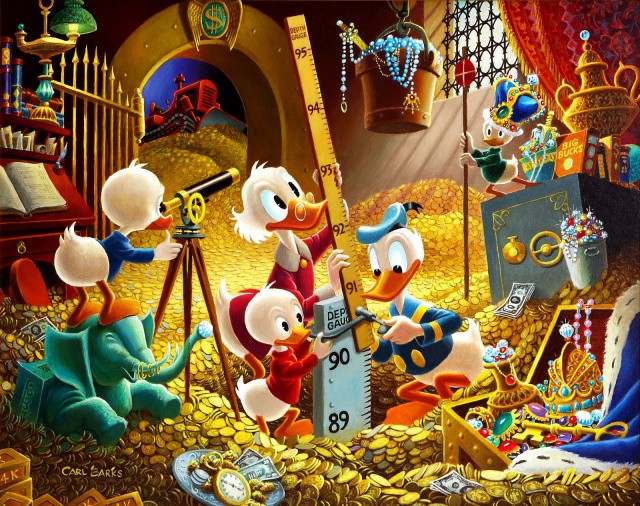Everyone is generous about advising Apple on how it should spend its billions.
Apple should buy Twitter, according to financial analyst and blogger, Barry Ritholtz.
Apple could become a bank, according to consulting company KAE. Or maybe just buy American Express.
Apple should buy a chip manufacturer, Dell, Nintendo, Disney, Tesla, Sprint, Nvidia, VISA, Newsweek, the US Postal Service, according to a seemingly endless list of pundits.
Gimme a break.
I think Apple should buy… nothing. Here’s why.
To suggest that Apple should buy major, brand-name companies is to suggest that the most successful company in the world should start doing everything differently from before, and stray from its successful way of doing things.
Gobbling up big companies and major brands would make Apple more like other companies and less like Apple. That’s not right. Other companies should become more like Apple, not the other way around.
Advice for Apple to buy major companies would be more persuasive if those giving such advice could point to successful cases. Big acquisitions are usually driven by overpaid suits who blather about “synergies” and new markets but who in fact are deluded that deals that appear successful “on paper” will actually succeed.
The reality is that to acquire a company is to become that company, to some degree. To acquire a large company is to hire employees en masse, most of whom you would not have hired if they walked in the door looking for a job and most of whom wouldn’t want to work for your company anyway.
The leaders of the companies you hire have all the wrong incentives and motivations — they’re in “cash-out mode,” for the most part. They’re going for the money, and rarely believe in the company that’s acquiring them. They typically just go through the motions for 18 months or however long their contract requires, then take the money and run as soon as they can.
Small acquisitions for bringing in core talent, acquiring IP or seriously advanced technology (like multi-touch or voice assistants) can make sense. But big acquisitions of major companies is for clueless bean-counters.
Besides, nearly all these proposed acquisitions come from an unspoken and deeply flawed assumption that because something can happen, that it should. Yes, Apple probably could buy Nintendo. So what? You could probably buy a goat and keep it in your living room. That doesn’t mean you should.
You might also note that many of the product decisions Apple critics complain about, also come from this same flawed assumption. Apple can build four USB ports into the iPad, and therefore it should have. Apple can add a stylus to the iPhone and therefore it should.
But one of the biggest and least appreciated ingredients in Apple’s breathtaking success is that it’s very disciplined about not falling for that kind of flawed reasoning.
HP shareholders grilled CEO Meg Whitman this week, asking why HP can’t be more like Apple, why HP hasn’t adopted Apple-like strategies in the consumer industry. They peppered her with questions about why HP spends so much more on R&D than Apple, yet is less innovative.
HP is a typical big company with zero vision that just follows the innovation leaders in every business it’s in. It offers me-too, copycat products and services in every area of business computing. HP doesn’t have any great products that I can think of, but they make it up on volume. Their sales people play golf with the right Fortune 500 buyers, and so HP is a reasonably successful Silicon Valley giant.
Instead of being visionary or innovative, HP uses its cash or stock to buy major companies. For example, it bought it’s main rival Compaq ten years ago for $25 billion, and mobile rival Palm for $1.2 billion.
As is always the case with such acquisitions, HP saw acquisitions as the solution to its problems.
The Palm press release said: “Palm’s unparalleled webOS platform will enhance HP’s ability to participate more aggressively in the fast-growing, highly profitable smartphone and connected mobile device markets.”
Of course that never happened. At this point, it’s not even clear that HP will even use the OS.
It’s fun to be an armchair CEO and fantasize about all the power you could grab by spending Apple’s hoard of cash. But to actually make any of these acquisitions would be foolish. If Apple were the kind of company that made such dumb moves, they wouldn’t have the cash to do it.
I don’t really care what they do with their money. What matters is that they don’t chase some acquisition fantasy down a rabbit hole every time they have the cash to do it.
The make-or-buy decision on any technology, product or service should rarely be about money, and should always be about focus, company culture and the long-term vision of the company.
Buying failed companies is buying problems, integration hassles, unmotivated employees, disgruntled customers, overhead and ultimately the culture of failure itself.
Apple doesn’t need that. Apple just needs to keep being Apple.
(Picture courtesy of Disney.)


